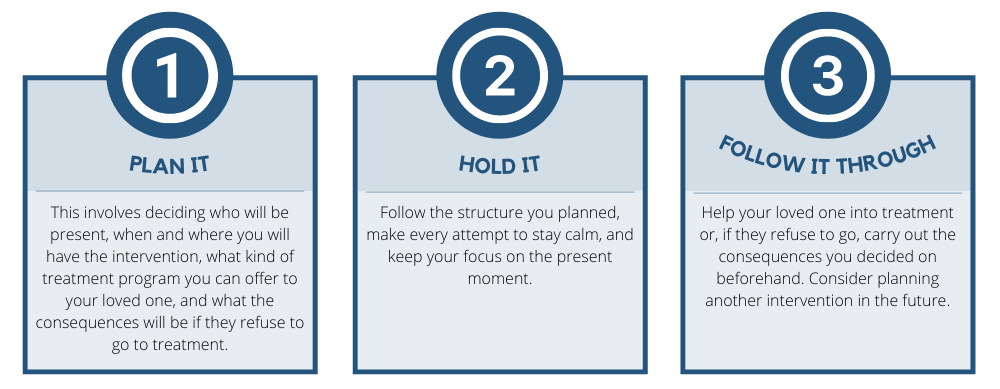Watching someone you love struggle with an addiction can be devastating. You may feel angry, hopeless, frustrated, or sad–or a range of other emotions that can change from day to day. When addiction has someone you care for in its grasp, most people want to act quickly to get the person into addiction treatment. After all, the consequences of addiction can be severe. People who live with substance abuse and addiction often face long-lasting damage to their physical and mental health, can end up losing jobs and relationships, and can even end up in serious legal and financial trouble.
While it is tempting to jump in and try to force someone you love into treatment, this often fails. If you are planning to encourage your loved one to seek substance abuse treatment, you must plan what you will say and what kind of help you can offer ahead of time. When faced with this difficult situation, many people plan an event called an intervention. An intervention is a planned, intentional conversation with your loved one about their addiction. There are many different types of intervention, but the goal of each type is the same: to get the person to go to addiction treatment.
If you have done any kind of research about holding an intervention, you know that there is plenty of information available about what things you should avoid saying. But how do you know what to say during an intervention to get your message across and achieve your goal of getting your loved one to seek help?
Understanding the process of planning a successful intervention and the right things to say can help you prepare for your intervention and give you the best chance at being successful.
What are the Steps of an Intervention?
The first step of holding an intervention is realizing that your loved one is struggling with addiction. Once it becomes clear that they require addiction treatment, you can begin to plan your intervention.

- Plan it: This involves deciding who will be present, when and where you will have the intervention, what kind of treatment program you can offer to your loved one, and what the consequences will be if they refuse to go to treatment (if appropriate). Learning about addiction, practicing beforehand, and having the support of a professional make it more likely that your intervention will be successful.
- Hold it: Follow the structure you planned, make every attempt to stay calm, and keep your focus on the present moment.
- Follow-through: Help your loved one into treatment or, if they refuse to go, carry out the consequences you decided on beforehand. Consider planning another intervention in the future.
The most important aspect of any intervention is making sure everyone involved is on the same page. It is crucial that everyone has the same goal: to lovingly encourage the person to start addiction treatment.
What to Say During an Intervention
A good intervention comes from a place of concern. Even if your loved one refuses to get treatment, they will understand that they can come to you in the future without fear of being judged or turned away. If you find yourself wondering what to say during an intervention, consider:
- I love you. Reassure them that you love them, despite their actions, choices, or mistakes.
- Thank you for everything you’ve done for me. It is important to tell your loved one how grateful you are for your relationship and everything that happened in the past.
- I will continue to support you. You are not only there to do an intervention–you are there to offer your long-term support, even when things don’t go as planned.
- I’m worried about our children/marriage/goals. It is important to tell them what you are worried about and remind them of the good parts of their life that they can return to.
- Addiction is a physical disease. It is important to tell your loved one that you believe in their ability to recover and heal from the addiction.
- Addiction treatment works. Help your loved one trust the process of treatment and recovery by sharing your own confidence in the process.
You do not have to use these specific words, but your message must be calm, supportive, loving, and confident in order to be effective.
Understanding the Benefits of Staying Positive During an Intervention
It can feel difficult–almost impossible–to maintain your positivity during an intervention. The time leading up to an intervention can be challenging and emotional. It is important to leave those difficult emotions behind during the intervention and to focus completely on care and support for your loved one.
By staying positive and loving, your loved ones will know that they can come to you. Alternately, if you demand that they go to treatment or tell them how angry you are, you run the risk of pushing them away. Keep the door of communication open so your loved one knows that you are there to support them if they need it, either now or in the future.
A trained interventionist can help prepare you and others to hold a successful intervention. They can provide counseling and education, help you know exactly what to say during an intervention, and help everyone stay focused on the most important goal: getting your loved one the addiction treatment they need.
Learn More About Planning an Intervention at New Jersey Addiction Interventions
If you or someone you love requires addiction treatment or support at any point in your recovery from addiction, reach out to the staff at New Jersey Addiction Interventions. In addition to helping people plan successful interventions, we offer a range of programs designed to help people recover from addiction and gain the skills they need to live healthy, fulfilling lives.
Call now to get started.
Medically Reviewed: October 4, 2021

All of the information on this page has been reviewed and verified by a certified addiction professional.

